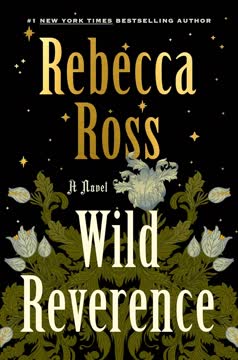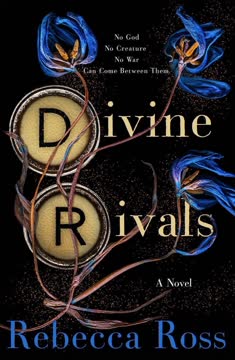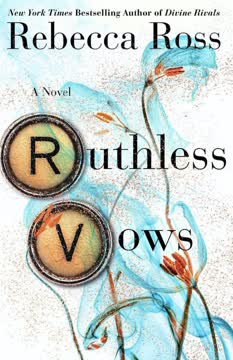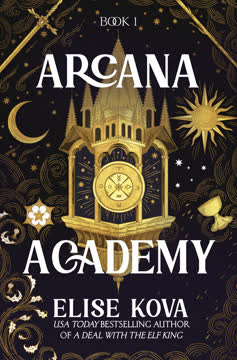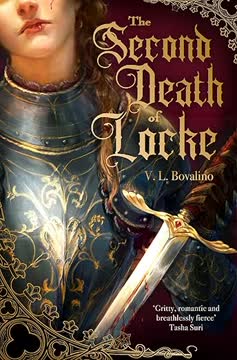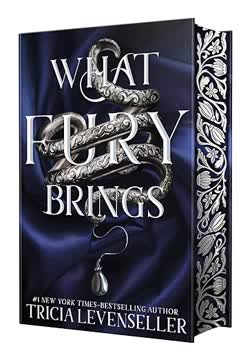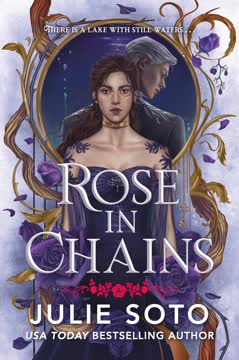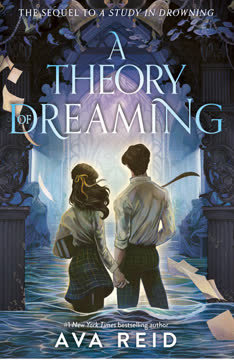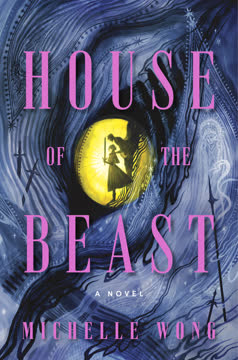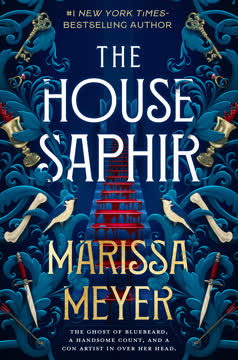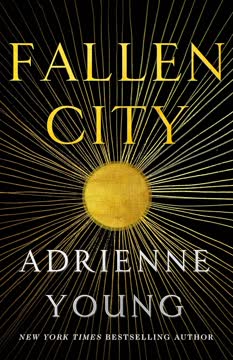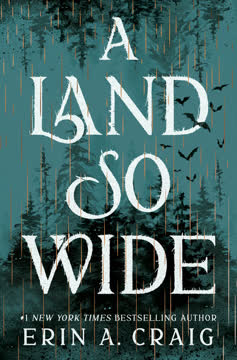Plot Summary
Birth Beneath Divided Stars
Matilda, daughter of Zenia (Underling goddess of winter, fire, and cunning) and Thile (Skyward god of dusk, oaths, and summer), is born in secrecy, her parentage straddling the warring divine courts. Her horoscope reveals her as a herald—destined to carry messages between realms, but her mixed blood and six-point constellation mark her as both vulnerable and unique. Zenia raises her in the underworld, teaching her caution, for gods covet power and would kill to steal her magic. Matilda's identity is shaped by her isolation, her mother's fierce love, and the knowledge that movement and secrecy are her only shields.
Salt Vows and Shields
To protect Matilda, Zenia orchestrates a salt vow with Bade, the god of war, binding him to be Matilda's loyal ally and teacher. Bade's lessons are harsh, teaching her to wield shield and sword, to harden her heart, and to understand the fault lines—mind and heart—that can end a god's immortality. The salt vow is both comfort and burden, a promise of protection that comes at the cost of vulnerability. Matilda's training is relentless, and she learns that in a world of gods, love is a dangerous weakness, and trust is a rare currency.
Dreams Cross Mortal Boundaries
Matilda discovers Alva's scrolls of mortal dreams, and through them, she forms a mysterious bond with Vincent, a mortal boy haunted by nightmares of drowning and abandonment. Their connection transcends time and space, as Matilda becomes a figure of hope and rescue in Vincent's dreams, even as she remains hidden from the waking world. This dream-bond shapes both their fates, planting the seeds of longing, recognition, and the ache of what might be. The dreams become a secret refuge for Matilda, a place where she can be seen and loved without fear.
Forbidden Magic and Scales
Zenia and her ally Phelyra traffic in forbidden goods—eithral scales and Skyward coins—trading with enemies for power and beauty. Matilda witnesses the peril of these bargains, as the scales can cut through anything, even a god's heart, and the coins hold stolen music and magic. The underworld is rife with secrets, betrayals, and the ever-present threat of discovery. Matilda's curiosity and compassion put her at odds with her mother's caution, and she learns that even gifts can be snares, and that the price of power is often paid in blood.
The Poet Queen's War
Bade is drawn into the mortal war between the Ousted King and Adria, the Poet Queen, whose words and charisma threaten the gods' power. Zenia counsels Bade to woo, not kill, Adria, hoping to prolong the war and maintain Underling influence. The gods' fates are tied to mortal prayers and stories, and Adria's rise as a mortal queen who rivals the gods foreshadows the blurring of boundaries between realms. Matilda observes the devastation of war and the seductive power of mortal love and legend.
A Mortal Boy's Longing
In the mortal realm, Vincent grows up in the shadow of loss, longing for purpose and connection. His dreams of Matilda become a lifeline, a source of courage and hope. As his family is torn apart by betrayal and violence, Vincent's desire to fight for the Poet Queen and to be seen by the gods becomes a driving force. His bond with Matilda, though forged in dreams, becomes the axis of his emotional world, and his longing for her shapes the choices that will define both their fates.
The Thorn and the Herald
Bade's entanglement with Adria deepens, exposing the vulnerability of even the fiercest gods. Matilda receives a moonstone belt enchanted with pockets, a symbol of her growing power and the alliances that both protect and endanger her. As Matilda's magic awakens, she is drawn into the web of divine and mortal politics, learning that every gift and every vow carries a hidden cost. The lines between ally and enemy blur, and Matilda must navigate a world where love is both a weapon and a wound.
Ruses and River Tolls
To protect Vincent from his treacherous uncle Grimald, Matilda proposes a ruse: they will pretend to be married, forging an alliance that will deter attack. Meanwhile, Warin, the god of spring and rivers, demands a toll for passage—first fruits, gold, or third-born children—threatening to tip the balance of power. Matilda's borrowed magic and cleverness are tested as she navigates the dangers of mortal and divine bargains, and the boundaries between pretense and true feeling begin to dissolve.
Marriage as a Shield
The ruse of marriage becomes a crucible for Matilda and Vincent, forcing them to confront their feelings and the risks of vulnerability. As they practice intimacy and trust, the line between act and reality blurs, and their partnership becomes both a shield and a source of longing. The siege of Wyndrift looms, and the couple must rely on each other and their allies to survive. The cost of love—its power to heal and to expose—becomes ever more apparent.
The Bridge Under Siege
Grimald's forces, aided by Warin's magic and Hugh's betrayal, assault Wyndrift by river and by force. Matilda wields borrowed fire and winter, freezing the river and defending the fortress, but the battle exacts a heavy toll. Nathaniel, Vincent's brother, is killed, and Matilda must bargain with Death to bring him back, agreeing to seven years of service in the wasteland. The siege is won, but at the cost of innocence, trust, and the certainty of reunion.
Bargains with Death
In the wasteland, Matilda learns the true nature of her magic: she can bear souls back from death, but not her own. She records the stories of the dead for the Gatekeeper, weighing lives and granting or denying passage to the mists. The cost of interfering with fate is steep, and Matilda's compassion is both her strength and her undoing. The boundaries between life and death, love and loss, are tested as she fulfills her bargain and waits for the chance to return.
The Wasteland's Gate
As Matilda serves her seven years, Vincent grieves and rebuilds, haunted by dreams and the memory of their love. Letters and prayers cross the realms, carrying longing and confession. Matilda's power grows, but so does her loneliness, and the question of whether love can survive time and death becomes the heart of her story. The wasteland is both prison and crucible, shaping Matilda into something new.
The Price of Power
Warin's ambition and cruelty are revealed as he enslaves mortals and seeks to steal Matilda's soul-bearing magic. In a final confrontation, Matilda and Bade face Warin in the snowy woods. Warin kills Bade and mortally wounds Matilda, but she strikes back, killing Warin with an eithral scale and inheriting his magic. The cost of power is paid in blood, and the cycle of violence and sacrifice continues.
Winter's Fury, Spring's Betrayal
Matilda dies in Vincent's arms, her soul trapped in the wasteland, unable to return. Bade is brought back, but Matilda cannot bear her own soul across the threshold. Vincent mourns, waiting years for her return, as the world moves on. The myth of the goddess who loved a mortal becomes legend, and the scars of winter and spring mark the land and the hearts of those left behind.
The Mortal Lord's Choice
Vincent relinquishes his title, choosing a quiet life on the land, surrounded by friends and the memory of Matilda. Letters and dreams become the threads that bind them across realms, and the hope of reunion lingers like a promise. The power of choice—of letting go, of waiting, of loving despite loss—becomes the final inheritance of both mortal and divine.
Seven Years in Shadow
Matilda fulfills her seven years in the wasteland, recording the stories of the dead and learning the limits and possibilities of her magic. She sends a letter to Vincent, and when her service ends, she returns to the mortal world, finding him older but waiting. Their reunion is quiet, tender, and hard-won, a testament to the endurance of love and the possibility of new beginnings.
Letters Across Realms
In the years that follow, Matilda and Vincent build a life together, their love a quiet myth that endures beyond death. Their story becomes a legend, retold and reshaped by mortals and gods alike. In a distant future, Matilda's magic is called upon to connect souls and words across realms, rewriting the old myths and proving that love—mortal and divine—can outlast even the gods.
Myths Rewritten by Love
In the epilogue, Matilda's legacy endures as her magic is used to connect lives and stories in a new age. The myths of gods and mortals are rewritten, not by violence or conquest, but by love, sacrifice, and the courage to hope. The story closes with the affirmation that the divine is nothing without mortal hearts, and that to love and be remembered is the greatest magic of all.
Characters
Matilda
Matilda is the daughter of Zenia and Thile, born of both Underling and Skyward blood, making her a unique bridge between warring divine courts. Raised in secrecy and danger, she is shaped by her mother's fierce love and her own longing for belonging. Matilda's magic as a herald is initially seen as humble, but her compassion, curiosity, and courage reveal deeper powers—she can bear souls back from death, rewrite fate, and connect realms through words. Her relationships—with her mother, Bade, Vincent, and her own divided self—are marked by longing, sacrifice, and the struggle to reconcile love and power. Over the course of the story, Matilda evolves from a vulnerable child to a mythic figure, her scars and choices becoming the foundation of a new legend.
Vincent
Vincent is a mortal boy haunted by loss, longing, and the ache of being left behind. His connection to Matilda, forged in dreams, becomes the axis of his emotional world, shaping his choices and his destiny. As he grows from a desperate child to a lord and then a humble farmer, Vincent's journey is marked by grief, resilience, and the courage to love across impossible boundaries. His longing for Matilda is both his strength and his vulnerability, and his willingness to wait, to hope, and to let go becomes the heart of the story's emotional arc.
Zenia
Zenia is a high-court Underling, marked by ambition, secrecy, and the willingness to do whatever it takes to protect her daughter. Her love is both shield and snare, teaching Matilda caution and the cost of power. Zenia's alliances and forbidden trades set much of the plot in motion, and her death at the hands of Phelyra is a turning point that propels Matilda into exile and transformation. Zenia's legacy is both a burden and a gift, shaping Matilda's understanding of love, sacrifice, and survival.
Bade
Bade is a complex figure—scarred, gruff, and feared, yet capable of deep loyalty and tenderness. His salt vow to Matilda binds him to her as protector and teacher, and his relationship with Adria, the Poet Queen, reveals the vulnerability beneath his martial exterior. Bade's journey is one of softening, learning the cost of love, and ultimately sacrificing himself for those he cares for. His death and resurrection are pivotal, and his role as Matilda's chosen father is both a source of strength and sorrow.
Phelyra
Phelyra is a master of secrets, pockets, and shifting alliances. Her ambition and cunning make her both ally and enemy, and her betrayal—killing Zenia for power—marks her as a cautionary figure. Phelyra's magic is seductive, her gifts double-edged, and her survival instincts ruthless. She embodies the dangers of unchecked ambition and the cost of betrayal among gods.
Warin
Warin is beautiful, proud, and hungry for power. His relationship with Matilda is marked by desire, jealousy, and the need to possess what he cannot have. Warin's bargains and betrayals drive much of the conflict, and his eventual death at Matilda's hand is both justice and tragedy. He represents the dangers of unchecked desire and the destructive power of envy.
Adria
Adria rises from mortal queen to goddess, her words and charisma rivaling the power of the gods. Her transformation is both miracle and warning, as she becomes a new matriarch, able to bestow crowns and protect magic from theft. Adria's love for Bade and her compassion for mortals make her a symbol of hope and the possibility of change. Her role as peacemaker and crown-giver is central to the story's resolution.
Alva
Alva is a master of secrets, dreams, and subtle influence. Her relationship with Matilda is complex—part mentor, part rival, part threat. Alva's desire to control Matilda's power and her willingness to betray for knowledge make her a dangerous figure. She embodies the seductive power of dreams and the peril of unchecked curiosity.
Thile
Thile is a figure of authority, tradition, and pride. His relationship with Matilda is marked by distance, disappointment, and the struggle to reconcile love and duty. His public punishment of Matilda is both a display of power and a moment of vulnerability, revealing the cost of upholding order at the expense of compassion.
The Gatekeeper
The Gatekeeper is an ancient, enigmatic figure who weighs souls and controls passage to the mists. Her bargains with Matilda shape the story's exploration of death, memory, and the possibility of return. She is both jailer and teacher, her scales a symbol of justice and the limits of power.
Plot Devices
Dual Realms and Divided Identity
The narrative is structured around the tension between the Underling and Skyward realms, with the mortal world as the contested ground. Matilda's mixed heritage and ability to move between realms serve as both plot engine and metaphor for divided identity, belonging, and the possibility of reconciliation. The story uses this structure to explore themes of exile, homecoming, and the cost of crossing boundaries.
Salt Vows, Bargains, and Oaths
Vows—salt-sworn, borrowed magic, bargains with Death—are central to the plot, shaping alliances, betrayals, and the limits of agency. The breaking and keeping of vows drive character development and plot twists, highlighting the tension between duty and desire, love and power.
Dreams, Letters, and Prayers
Dreams, letters, and prayers are used as plot devices to connect characters across time and space, to reveal hidden feelings, and to challenge the boundaries of magic. The motif of words—written, spoken, swallowed—serves as both literal and symbolic bridge, enabling communication, confession, and transformation.
The Wasteland and the Gate
The wasteland, with its gates, scales, and mists, is both setting and metaphor for the story's exploration of mortality, memory, and the possibility of return. The rules of the wasteland—stories as bones, the price of resurrection, the limits of power—structure the narrative's most poignant moments, forcing characters to confront loss, longing, and the meaning of home.
Foreshadowing and Circular Structure
The story is rich in foreshadowing—prophecies, horoscopes, dreams, and the ever-present threat of betrayal. The narrative is circular, with motifs and plot points returning in new forms: vows made and broken, deaths and resurrections, letters sent and received. This structure reinforces the themes of endurance, transformation, and the rewriting of myths.
Analysis
Rebecca Ross's Wild Reverence is a sweeping, mythic fantasy that interrogates the boundaries between gods and mortals, love and power, fate and agency. At its heart, the novel is a meditation on the cost of love in a world ruled by bargains, betrayals, and the hunger for immortality. Through Matilda—a child of two warring realms, marked by both vulnerability and unique power—the story explores the pain and possibility of divided identity, the courage required to love across boundaries, and the endurance of hope in the face of loss. The novel's use of dreams, letters, and prayers as bridges between worlds is both literal and symbolic, affirming the power of words to connect, heal, and transform. The wasteland, with its scales and mists, becomes a crucible for the soul, forcing characters to reckon with the stories they tell and the debts they owe. Ultimately, Wild Reverence argues that the divine is nothing without mortal hearts, and that the greatest magic is not in conquest or immortality, but in the willingness to love, to wait, and to be remembered. The story's final act—myths rewritten by love, and the endurance of a quiet, hard-won happiness—offers a powerful, modern affirmation: that to love and be loved, even for a brief moment, is to change the world.
Last updated:
Review Summary
Wild Reverence receives overwhelmingly positive reviews, with readers praising its beautiful writing, complex world-building, and emotional depth. Set in the same universe as Divine Rivals, this prequel explores the love story between a goddess and a mortal. Fans appreciate the rich mythology, character development, and the way it enhances understanding of the previous books. While some found the pacing slow initially, most were captivated by the romance and themes of sacrifice, fate, and self-discovery. Reviewers consistently mention the book's ability to evoke strong emotions and leave a lasting impact.
Letters of Enchantment Series
Similar Books
Download PDF
Download EPUB
.epub digital book format is ideal for reading ebooks on phones, tablets, and e-readers.
